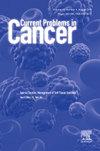Contribution of BARD1 gene to male breast cancer- report of a family with different types of cancer
IF 2.3
4区 医学
Q3 ONCOLOGY
引用次数: 0
Abstract
Background
Breast cancer (BC) arises from a combination of genetic and environmental factors, continues to be the leading cause of cancer-related mortality among women. Although male BC accounts for <1 % of all BC cases, its incidence seems to be increasing. Germline pathogenic variants in cancer susceptibility genes underlie about 30 % of male BC patients. This study aimed to identify the genetic cause of BC in a man to facilitate his clinical management and enable genetic counseling and preventive screening for his at-risk relatives.
Methods
We conducted a clinical examination and molecular genetic testing on a man with BC having a family history of several malignancies. BRCA sequencing panel followed by exome sequencing (ES) were performed and bioinformatics tools were used to evaluate the variants’ pathogenicity. ACMG guidelines was used for the variant interpretation and Sanger sequencing and co-segregation analysis were performed for its confirmation.
Results
According to ES findings, a novel heterozygous variant (c.1802T>C) was detected in the BARD1 gene, fulfilling the pathogenic criteria. The proband’s brother, suffering from colorectal cancer, was also found to harbor this variant, suggesting its role in the familial clustering of both breast and colorectal cancer.
Conclusion
We successfully identified a novel BARD1 pathogenic variant in an Iranian man suffering from BC. Identification of disease-causing variant in some cancer, especially male BC can be useful in genetic counseling, early diagnosis and implementing preventive measures. We also recommend cancer genetic counseling for the healthy at-risk family members, with a focus on different hereditary cancer syndromes.
BARD1基因在男性乳腺癌中的作用——一个不同类型癌症家族的报告
乳腺癌(BC)由遗传和环境因素共同引起,一直是女性癌症相关死亡的主要原因。虽然男性BC占所有BC病例的1%,但其发病率似乎在增加。癌症易感基因的种系致病性变异是约30%男性BC患者的基础。本研究旨在确定男性BC的遗传原因,以促进其临床管理,并为其高危亲属提供遗传咨询和预防性筛查。方法对1例有多种恶性肿瘤家族史的男性BC患者进行临床检查和分子基因检测。进行BRCA测序面板和外显子组测序(ES),并使用生物信息学工具评估变异的致病性。使用ACMG指南进行变异解释,并进行Sanger测序和共分离分析以确认其结果。结果在BARD1基因中检测到一个新的杂合变异(C . 1802t>;C),符合致病标准。该先证者患有结直肠癌的兄弟也被发现携带这种变异,这表明它在乳腺癌和结直肠癌的家族聚集性中发挥了作用。结论:我们成功鉴定出一种新的BARD1致病性变异。识别某些癌症的致病变异,特别是男性BC,可用于遗传咨询、早期诊断和实施预防措施。我们还建议癌症遗传咨询健康的高危家庭成员,重点是不同的遗传性癌症综合征。
本文章由计算机程序翻译,如有差异,请以英文原文为准。
求助全文
约1分钟内获得全文
求助全文
来源期刊

Current Problems in Cancer
医学-肿瘤学
CiteScore
5.10
自引率
0.00%
发文量
71
审稿时长
15 days
期刊介绍:
Current Problems in Cancer seeks to promote and disseminate innovative, transformative, and impactful data on patient-oriented cancer research and clinical care. Specifically, the journal''s scope is focused on reporting the results of well-designed cancer studies that influence/alter practice or identify new directions in clinical cancer research. These studies can include novel therapeutic approaches, new strategies for early diagnosis, cancer clinical trials, and supportive care, among others. Papers that focus solely on laboratory-based or basic science research are discouraged. The journal''s format also allows, on occasion, for a multi-faceted overview of a single topic via a curated selection of review articles, while also offering articles that present dynamic material that influences the oncology field.
 求助内容:
求助内容: 应助结果提醒方式:
应助结果提醒方式:


